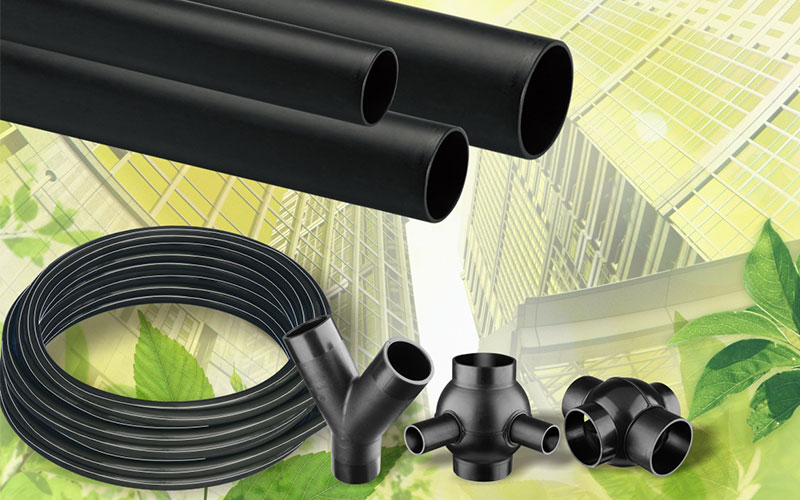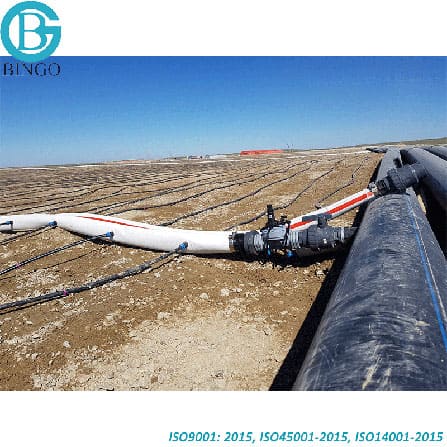Where Contractors Can Get Midland TX HDPE Pipe Fittings in Stock for Construction Projects
A Comprehensive Overview to the Various Usages of HDPE Pipeline in Building and Market
HDPE pipes have emerged as a crucial component in modern construction and industrial applications. Their one-of-a-kind buildings, such as resistance to rust and light-weight style, make them appropriate for a large range of uses. From supply of water systems to agricultural watering, HDPE pipelines use options that boost efficiency and sustainability. Recognizing their diverse applications is vital for experts looking to optimize framework. What particular benefits do these pipes bring to each field?
Water Supply and Distribution Solutions
Water system and circulation systems are essential parts of urban infrastructure, commonly relying on high-density polyethylene (HDPE) pipelines for their sturdiness and efficiency. These systems transportation potable water from treatment centers to consumers, making sure access and security. HDPE pipelines are favored for their resistance to deterioration, chemicals, and extreme temperature levels, which improves their durability and decreases upkeep expenses. In addition, their light-weight nature permits much easier installation and transportation, making them ideal for numerous urban and rural applications.
The versatility of HDPE pipelines enables them to be mounted in limited areas and around obstacles, lessening the demand for substantial excavation (custom hdpe pipe manufacturing Midland TX). Furthermore, their smooth indoor surface reduces rubbing losses, boosting water circulation rates. As cities continue to grow, the demand for reputable supply of water systems boosts, positioning HDPE pipelines as a sustainable remedy for contemporary infrastructure projects. Their proven track document makes them a favored choice among designers and metropolitan coordinators alike
Wastewater Administration and Treatment
Reliable wastewater management and treatment are important for maintaining public health and ecological quality. HDPE pipelines play a crucial function in this procedure because of their longevity, resistance to deterioration, and capability to hold up against severe chemicals. These pipes are typically made use of in various applications, consisting of sewer systems, stormwater drain, and wastewater treatment facilities. Their light-weight nature promotes less complicated setup and transport, reducing labor expenses and time.
Furthermore, HDPE pipelines have a smooth interior surface that decreases rubbing loss, advertising reliable flow rates. They are likewise much less vulnerable to leakages and failures compared to traditional materials, making sure that pollutants are included efficiently. Furthermore, their flexibility permits adaptability in various dirt problems, making them suitable for diverse ecological setups. As sectors significantly prioritize lasting techniques, using HDPE pipes in wastewater monitoring systems aligns with objectives for lowering ecological impact and improving source recuperation.
Agricultural Watering Solutions
In farming settings, efficient irrigation options are necessary for maximizing crop returns and handling water sources. HDPE (High-Density Polyethylene) pipelines play a crucial role in modern watering systems due to their longevity, flexibility, and resistance to corrosion. Their capability to endure high pressures makes them ideal for both surface area and subsurface watering applications, making sure consistent water circulation across fields.
Farmers can use HDPE pipelines in drip watering systems, which provide water straight to plant origins, lessening waste and promoting healthy development. In addition, these pipelines are lightweight and simple to set up, reducing labor expenses and setup time. Their lengthy lifespan and reduced upkeep demands additionally enhance their charm in agricultural techniques.
HDPE pipes are ecologically friendly, as they can be recycled and do not leach harmful chemicals into the dirt. This makes them a lasting choice for farmers intending to embrace environment-friendly farming techniques while making the most of performance.
Industrial Applications and Processes
Adaptability is a hallmark of HDPE pipes, making them indispensable in various industrial applications and processes. These pipelines are commonly utilized in chemical processing markets due to their excellent resistance to a broad range of corrosive substances. HDPE's lightweight nature, combined with high tensile strength, permits for very easy installment and long-term performance popular settings.
In the oil and gas field, HDPE pipes play a necessary role in carrying hydrocarbons and gases, many thanks to their toughness and adaptability - American Plastics HDPE Pipe Manufacturing. In addition, they are utilized in mining operations for the transport of slurry and various other products, where conventional piping systems might stop working
Additionally, HDPE pipes are increasingly used in manufacturing centers for water system lines and wastewater management. Their capacity to endure severe temperature levels and pressures makes them appropriate for a range of commercial procedures. Generally, HDPE pipes contribute considerably to effectiveness and safety and security throughout varied industrial applications.
Stormwater Monitoring and Drainage Systems
Stormwater management and drain systems are essential elements in urban facilities, made to take care of excess rains and minimize flooding threats. High-density polyethylene (HDPE) pipes are increasingly used in these systems due to their durability, versatility, and resistance to rust. These pipelines effectively transport stormwater far from booming locations, lessening surface overflow and stopping waterlogging.
HDPE's lightweight nature assists in much easier installation, lowering labor costs and building and construction time. Furthermore, its resistance to chemicals and ecological stressors guarantees long life and integrity in numerous environments. Along with conventional drain applications, HDPE pipelines are also used in ingenious remedies such as environment-friendly framework, that includes rain yards and permeable pavements.

Often Asked Inquiries
Just How Does HDPE Pipe Contrast to PVC Pipe in Price?
As a whole, HDPE pipeline often tends to be more pricey than PVC pipe as a result of its enhanced toughness and flexibility. Lasting cost factors to consider, such as upkeep and life expectancy, might prefer HDPE in specific applications.
What Is the Life-span of HDPE Piping Under Diverse Conditions?
HDPE pipes generally have a lifespan of 50 to 100 years, depending on ecological problems, installation techniques, and use. Variables such as temperature, dirt kind, and direct exposure to chemicals can significantly influence their resilience.
Can HDPE Pipeline Be Recycled After Use?
Yes, HDPE pipes can be recycled after usage. The reusing procedure involves thawing down the material, permitting it to be repurposed right into new products, thereby advertising sustainability and minimizing ecological influence related to plastic waste.
Are There Any Type Of Details Installment Challenges With HDPE Pipelines?
Setup challenges with HDPE pipelines include proper jointing methods, making sure appropriate trench conditions, and handling thermal growth. Furthermore, skilled labor is called for to deal with specific devices, which can make complex the installation procedure in different atmospheres.

What Accreditations Should I Seek When Acquiring HDPE Pipings?
When acquiring HDPE pipes, one should try to find qualifications such as ASTM, AASHTO, and ISO, which verify quality and compliance with market criteria, assuring toughness and efficiency in various applications. - Pipe Manufacturing Midland TX